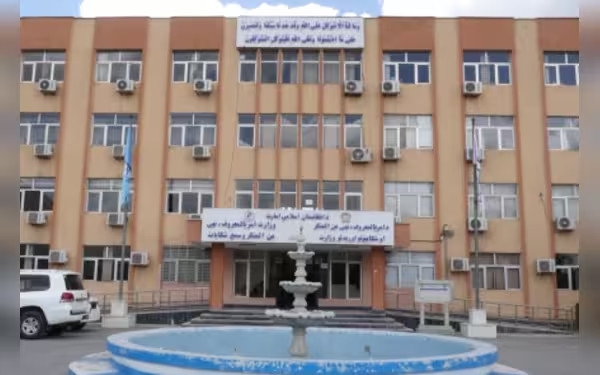Saturday, November 16, 2024 11:33 PM
UNAMA Report Criticized by Afghan Ministry of Vice and Virtue
- Ministry claims UNAMA report reflects non-Afghan values.
- Concerns raised over new restrictions on women.
- Analysts stress need for international engagement.
 Image Credits: thefrontierpost
Image Credits: thefrontierpostAfghan Ministry criticizes UNAMA report for non-Afghan values, highlighting women's rights concerns and the need for international engagement.
The ongoing debate surrounding human rights in Afghanistan has taken a new turn with the recent report released by the United Nations Assistance Mission in Afghanistan (UNAMA). This report has sparked a strong reaction from the Ministry of Vice and Virtue, which oversees moral and ethical conduct in the country. The ministry has criticized UNAMA for what it describes as a reliance on "non-Afghan" and "un-Islamic" values in its assessments of the human rights situation.
Saif-ul-Islam Khyber, the spokesperson for the Ministry of Vice and Virtue, expressed discontent with the UNAMA report, claiming it failed to acknowledge the ministry's accomplishments in areas such as inheritance rights and the prevention of forced marriages. Khyber stated, "UNAMA’s reports and those of its affiliated organizations often diverge from the actual work of the Ministry of Vice and Virtue and are based on values that reflect their own perspectives." This statement highlights a significant rift between the Afghan authorities and international organizations regarding the interpretation of human rights.
In its quarterly report, UNAMA pointed out that certain laws enacted by the Ministry of Vice and Virtue impose new restrictions on women, which has raised concerns among human rights advocates. The report noted, "The Law codifies a number of restrictions that had already been issued as decrees, edicts, and instructions by the de facto authorities. The Law also appears to broaden some preexisting restrictions and adds new ones." This assertion has been met with resistance from Afghan officials, who argue that the laws are in line with their cultural and religious values.
Political analysts have weighed in on the situation, emphasizing the importance of adhering to international standards. Shafiq Nasir remarked, "When a country drafts a constitution that explicitly expresses global policies and the rights of the people, such issues will not arise." Moeen Gul Samkanai added, "When we have a valid and strong document like the UN Security Council’s resolutions, we are obligated to adhere to United Nations resolutions in areas like education, sports, trade, and other international matters." These comments suggest that there is a growing recognition of the need for Afghanistan to engage with the international community while balancing its own cultural values.
The Ministry of Vice and Virtue's response to the UNAMA report reflects a broader struggle between traditional values and modern human rights standards. As Afghanistan navigates its path forward, it is crucial for the government to find a balance that respects its cultural heritage while also addressing the concerns raised by international bodies. The dialogue between Afghan authorities and organizations like UNAMA is essential for fostering understanding and promoting a more inclusive approach to human rights in the country.













